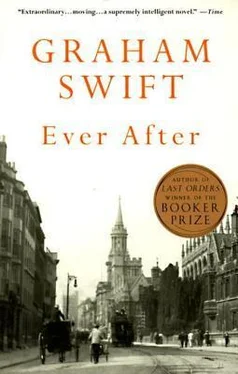20th August 1857:
To the Rectory for dinner. The first such occasion for some time. I observe the Rector cannot altogether restrain the animosity formerly confined to his study, though his good wife and Elizabeth mark nothing more than an unwonted testiness, for which they chide him, and he, good soul, is duly contrite. I introduce the subject of Brunel’s bridge, the first great truss for which is to be positioned next month; whereupon he adopts the popular stance of fearful and scornful incredulity. “But surely,” he exclaims, “the thing is impossible !” I see his drift: he will not attack me, not before Emily and Liz, but he will attack the bridge, which I defend, for its unholy presumption. “You tell me,” he says, in the manner of an ipso facto denunciation, “that the distance to be spanned is nigh on a thousand feet, and each truss will weigh over a thousand tons!”
How we human beings are so easily dismayed by effects of scale . The Saltash bridge is indeed a thing of vast proportions, but it is no less practicable, no less conformable to the laws of physics, than one of my father’s quietly ticking clocks. With a sketch or two and some mathematics, I could show — I offer to do so, but the Rector forbids such dinner-table science — how such a mighty thing is achieved. To be sure, there are many who take the immensity of I.K.B.’s schemes as a measure of his vainglory and as an omen of his ruin. But it is their calumny which inhibits his success, not the man’s own scrupulous calculations.
I confess that I too, on first meeting I.K.B., had my qualms. I shuddered — not only at the fierce effluvia of his cigars but to encounter one so plainly marked out, so naturally prepared for exceptionality; and my awe converted itself into that unthinking and superstitious suspicion that in some way he transgressed.
Transgressed what? Nothing more, I would say now, than the bounds of normality . Why are some picked by fate and some not? Why are we not all Brunels? That is the conundrum out of which we construct the false charge of impious presumption. And how much more, for me, was that mystery deepened by my observing, on further acquaintance, the ordinary human limits of the man. He is no sorcerer. He has sacrificed his health for his work, which only proves he is flesh and blood; and though he is beset by a thousand obstacles and is prey to a thousand practical anxieties, I do not believe — I do not assert this out of pride — that the roots of his soul have ever been rocked as mine have been or that he could have achieved what he has without the ballast of a steady conscience.
To build a bridge! Is not that one of the noblest of man’s endeavours? To link terra firma with terra firma; to throw a path across a void. The ignorant say it defies nature, yet it rests upon her co-operation. And I might profess to the Rector — if only I might still believe it — that such an enterprise only bespeaks the work of Him whom he serves. That our science attests a greater omniscience; that the Almighty has given to the humblest bird the gift of wings with which to perform the same feat, but only to man has He given the power of Design, which is the first principle of His universe.
6th January 1858:
Illogicality of nature. Lavishes attention on the individual (fall of each sparrow?) but sacrifices individual to species. Cares only for continuation of the stock. Should result in uniformity and conformity. Yet nothing more apparent in nature than diversity, differentiation, distinction. Why this?
Answer . ( a ) Bounty and inexhaustible resourcefulness of the Creator. So Creation may be wonderful in the sight of man. So we may rejoice in the skill of Him who made us and know Him thereby. “O Lord, how manifold are thy works! In wisdom has thou made them all: the earth is full of thy riches.”
Objection . We see only what we are pleased to see and are too apt to find in nature’s variety, in the infinite invention of her forms and colours, an aesthetic inspiration. We observe the butterfly but not the grub. We lament its brief, gorgeous life, but not that of the worm snatched by the bird. And what of the pretty plumage of the redbreast and the chaffinch as they go about their murder?
Answer . ( b ) Diversity makes possible interdependence of creatures, i.e., one would not be without the other: e.g., the spider, the fly; the bee, the flower, etc.
Objection . Makes of all creatures predators, plunderers or parasites — or victims of the same. Even-handedness or blindness of nature? Cares for the field vole and the buzzard?
Further illogicality of nature: Man. Uniformity and conformity firm principles within the species. A crow is a crow is a crow — for all his lack of insignia. Why, then, does individuality and the sense of individuality so profoundly imbue the species man? When I behold a crow I see only a crow. I do not feel the loss of one crow in a score, and it makes little sense to me to speak of a crow’s “identity.” Yet when I look at my little Lucy I see a creature whose identity, I know with absolute conviction, is unique and cannot be replaced. And this would be true even for the man I may meet in the street tomorrow and never see again.
Why in the human species should reproduction so belie its name? Why— argumentum ad absurdum —should not all human beings be the same ? And why should the resemblance between offspring and parents, which we like to think of as so strong, be, in fact, so imprecise and tenuous?
Answer . Because this is the palpable proof, registered in our innermost being, that we are elevated over the beasts, that we partake of the divine, that we possess a soul .
Objection . But why should the divine express itself in the imperfect? Since, if the essence of speciation is trueness to type, the species man is infested with randomness. Not a useless randomness, perhaps, since it equips us for a complex social existence in which, as we say, it “takes all sorts”; since it gives us our Brunels as well as our blacksmiths, and allows us all indeed (oh, misnomer!) to feel “special.” But would it not be the grossest piece of fabrication, to construct upon a condition so shifting and fickle — upon the chance mutations of progeniture and the lottery of identity — the notion of what is eternal, immutable and godlike in our nature?
Hamlet’s mother says to Hamlet, “Why seems it so particular with thee?” What is the difference between belief and make-belief? What makes us give to any one belief (since it is only a matter of shifting, tuning the mind) the peculiar weight of actuality? “For there is nothing either good or bad but thinking makes it so.” Little Felix was barely two. Ruth was forty-nine. A child of two, one has hardly begun to know. And an ichthyosaur . An ichthyosaur.
Who lets a Big Question upset his small, safe world? When matters reached their head, Rector Hunt, who still clung, perhaps, to the belief that that “inner man” in him, that former would-be missionary, might save the day, must have cursed Charles Darwin, not for his assault on religion — that could have been dismissed, he could have consigned the man to the realms of irrelevance so far as his congregation was concerned — but for timing the publication of his outrageous work so as to clinch his son-in-law’s apostasy, bring scandal on his family and parish, and smash for ever that image of himself as a spiritual champion. What was Darwin to him? What is Matthew to me? “What’s Hecuba to him or he to Hecuba?”
“Seems, madam? Nay, it is. I know not ‘seems.’ ”
Читать дальше












